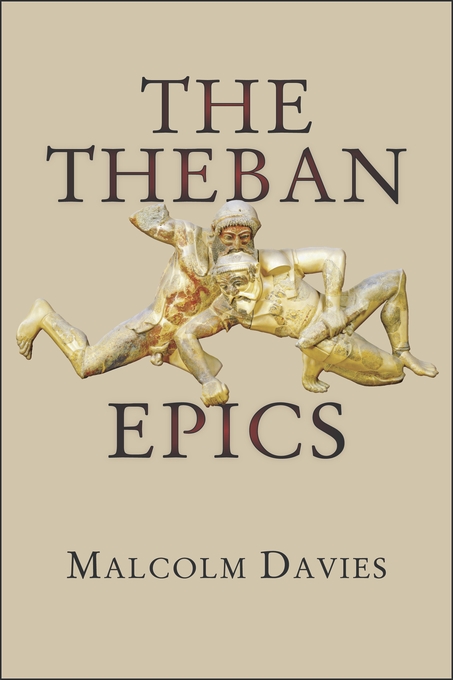 An Oxford academic has pieced together fragments of ancient epic poetry, revealing a new side to Ancient Greek culture in scenes of startling brutality, blasphemy, and even cannibalism.
An Oxford academic has pieced together fragments of ancient epic poetry, revealing a new side to Ancient Greek culture in scenes of startling brutality, blasphemy, and even cannibalism.
Today the best-known and most complete early Greek epics are the Iliad and Odyssey – but there were once many more. Together, they made up a continuous narrative called the Epic Cycle, which is now almost entirely lost.
In a new book, Professor Malcolm Davies of the Faculty of Classics at Oxford University, has charted the remaining traces of a series of these poems. The Theban Epics is the first commentary in English on the Oedipodeia, the Thebais and the Epigoni, which revolve around the attempt of seven warriors to sack the city of Thebes.
‘There are no surviving papyrus fragments of these poems,’ said Professor Davies. ‘But we can still infer a lot from references in later works. I looked at these ‘submerged’ fragments, and at the way the poems influenced later art and literature. In the case of the Thebais, we even have a few lines of the poem quoted.’
One passage in a later author, though containing no direct quotation, preserves an unusually gruesome episode from the Thebais. The warrior Tydeus has been mortally wounded by a Theban and both are dying. Tydeus seizes his attacker and bites into his head in revenge.
Another episode which appears in later literature and artwork almost certainly originated in the Thebais. A warrior called Capaneus climbs a siege ladder to assault the walls of Thebes, shouting boastfully as he does so and claiming to be greater than the gods. He is immediately struck down by Zeus’ thunderbolt.
‘These kinds of brutality and impiety are completely unknown in the Homeric epics,’ said Professor Davies. ‘Although the Iliad and Odyssey deal with war, pride and violence, no hero would commit an act of cannibalism, or defy the gods so crudely.’
The consequences of Tydeus’ brutality are equally revealing. The goddess Athena means to make Tydeus immortal, and she has gone as far as to prepare a potion for Tydeus which would grant him eternal life. But when she sees the gory scene, she changes her mind.

‘Some versions of the story even suggest that she pours away the drink on the ground in disgust,’ said Professor Davies. ‘Again, this is something that could never happen in the Iliad, in which the great heroes are defined by their mortality. The gap between humanity and the gods is central to that poem, but in the Theban epics the distinction seems to be muddied.’

 In the Iliad both Greeks and Trojans are treated sensitively, and there is no glorification of one side or the other. The Theban epics are much more black and white in their morality, and in their portrayal of vicious behaviour. Professor Davies points out that the two brothers, Eteocles and Polyneices, whose conflict spurs the attack on Thebes, may be drawn from earlier folktale traditions of the good and evil brother. This is reflected in their names: ‘Eteocles’ means ‘true glory’, whereas ‘Polyneices’ means ‘much strife’.
In the Iliad both Greeks and Trojans are treated sensitively, and there is no glorification of one side or the other. The Theban epics are much more black and white in their morality, and in their portrayal of vicious behaviour. Professor Davies points out that the two brothers, Eteocles and Polyneices, whose conflict spurs the attack on Thebes, may be drawn from earlier folktale traditions of the good and evil brother. This is reflected in their names: ‘Eteocles’ means ‘true glory’, whereas ‘Polyneices’ means ‘much strife’.
‘Tydeus’ barbaric act and the straightforwardly bad behaviour of Capaneus may have been much more typical of early Greek epic as a whole,’ said Professor Davies. ‘In fact, the Iliad and the Odyssey, though preserved precisely because of their literary merit and humane treatment of war, may have been the exceptions and the other poems of the Epic Cycle the rule.’
Sponsored Content


Today the best-known and most complete early Greek epics are the Iliad and Odyssey – but there were once many more. Together, they made up a continuous narrative called the Epic Cycle, which is now almost entirely lost.
In a new book, Professor Malcolm Davies of the Faculty of Classics at Oxford University, has charted the remaining traces of a series of these poems. The Theban Epics is the first commentary in English on the Oedipodeia, the Thebais and the Epigoni, which revolve around the attempt of seven warriors to sack the city of Thebes.
‘There are no surviving papyrus fragments of these poems,’ said Professor Davies. ‘But we can still infer a lot from references in later works. I looked at these ‘submerged’ fragments, and at the way the poems influenced later art and literature. In the case of the Thebais, we even have a few lines of the poem quoted.’
One passage in a later author, though containing no direct quotation, preserves an unusually gruesome episode from the Thebais. The warrior Tydeus has been mortally wounded by a Theban and both are dying. Tydeus seizes his attacker and bites into his head in revenge.
Another episode which appears in later literature and artwork almost certainly originated in the Thebais. A warrior called Capaneus climbs a siege ladder to assault the walls of Thebes, shouting boastfully as he does so and claiming to be greater than the gods. He is immediately struck down by Zeus’ thunderbolt.
‘These kinds of brutality and impiety are completely unknown in the Homeric epics,’ said Professor Davies. ‘Although the Iliad and Odyssey deal with war, pride and violence, no hero would commit an act of cannibalism, or defy the gods so crudely.’
The consequences of Tydeus’ brutality are equally revealing. The goddess Athena means to make Tydeus immortal, and she has gone as far as to prepare a potion for Tydeus which would grant him eternal life. But when she sees the gory scene, she changes her mind.
‘Some versions of the story even suggest that she pours away the drink on the ground in disgust,’ said Professor Davies. ‘Again, this is something that could never happen in the Iliad, in which the great heroes are defined by their mortality. The gap between humanity and the gods is central to that poem, but in the Theban epics the distinction seems to be muddied.’
‘Tydeus’ barbaric act and the straightforwardly bad behaviour of Capaneus may have been much more typical of early Greek epic as a whole,’ said Professor Davies. ‘In fact, the Iliad and the Odyssey, though preserved precisely because of their literary merit and humane treatment of war, may have been the exceptions and the other poems of the Epic Cycle the rule.’
Sponsored Content